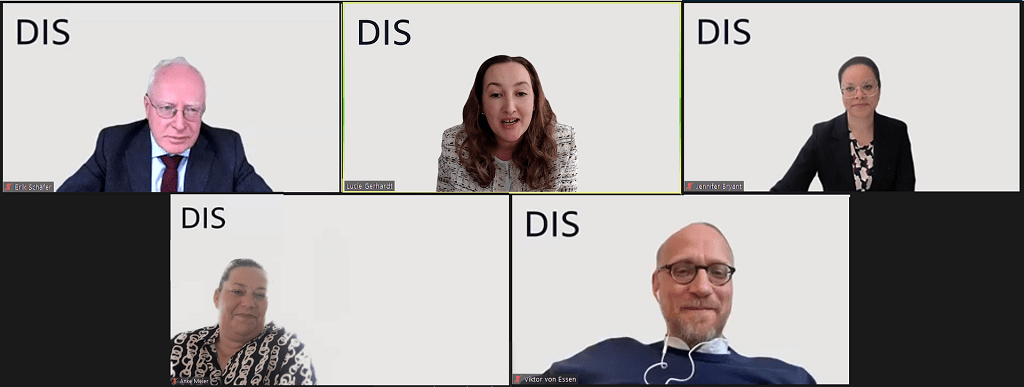
The topic of the very successful June session of the Lunch DIScussions was “Witness Statements, Chronologies and Opening Statements created by AI - technically possible and permissible?”. The event explored the role of artificial intelligence (“AI”) in international arbitration, focusing on current use cases and potential future applications as well as the implications of increased use of AI.

The distinguished panel included Anke Meier (Noerr), Erik Schäfer (Bodenheimer), and Viktor von Essen (Libra Technology), and was moderated by Lucie Gerhardt (Noerr). The discussion was very interactive and many of the 106 participants engaged actively in the debate.
The discussion began by taking stock of the current use of AI in arbitration proceedings from the perspectives of an arbitrator, a technology entrepreneur and a counsel. Based on the panelists’ extensive practice and experience in international arbitration in various jurisdictions, the use of AI evolved quickly and the ways in which arbitrators and counsel can benefit from AI are quite broad. Compared to other jurisdictions where the use of AI in a legal context is more common, such as the US, Germany is lagging behind. A poll of participants at the beginning of the session confirmed that while most practitioners had some general experience with the use of AI, only a minority had used AI during an arbitration before.
The panelists then delved into showing practical examples of how AI can be used to assist in drafting typical work products such as case chronologies and timelines based on a large number of documents. AI can also be used to draft opening statements in PPT format based on the content of the substantive submissions on record. With regard to witness statements, AI can be utilized to automatically transcribe meetings or witness interviews.
The panel agreed that there is even greater potential for future use cases, especially around generative AI. The human user, of course, remains responsible for the quality and accuracy of AI work products. This warrants the need for carefully checking the AI’s output, not least because of the risk of hallucinating AI.
The further topics discussed included questions about the GDPR and confidentiality. Sensitive or confidential data cannot be input into publicly available Large Language Models such as ChatGPT since chat content is processed and stored to train and optimize the algorithm. This is especially relevant in light of section 203 of the German Criminal Code that penalized the disclosure of third-party secrets by lawyers, among others.
The panelists also answered questions from the participants about if and in what degree of detail the use of AI in an arbitration is required to be disclosed to the arbitral tribunal and the other party. The panel agreed that if non-standard AI tools are used, there are valid arguments that speak for disclosure and that the case management conference can be a suitable forum to disclose and discuss the use of AI between the arbitral tribunal and the parties.
Lucie Gerhardt